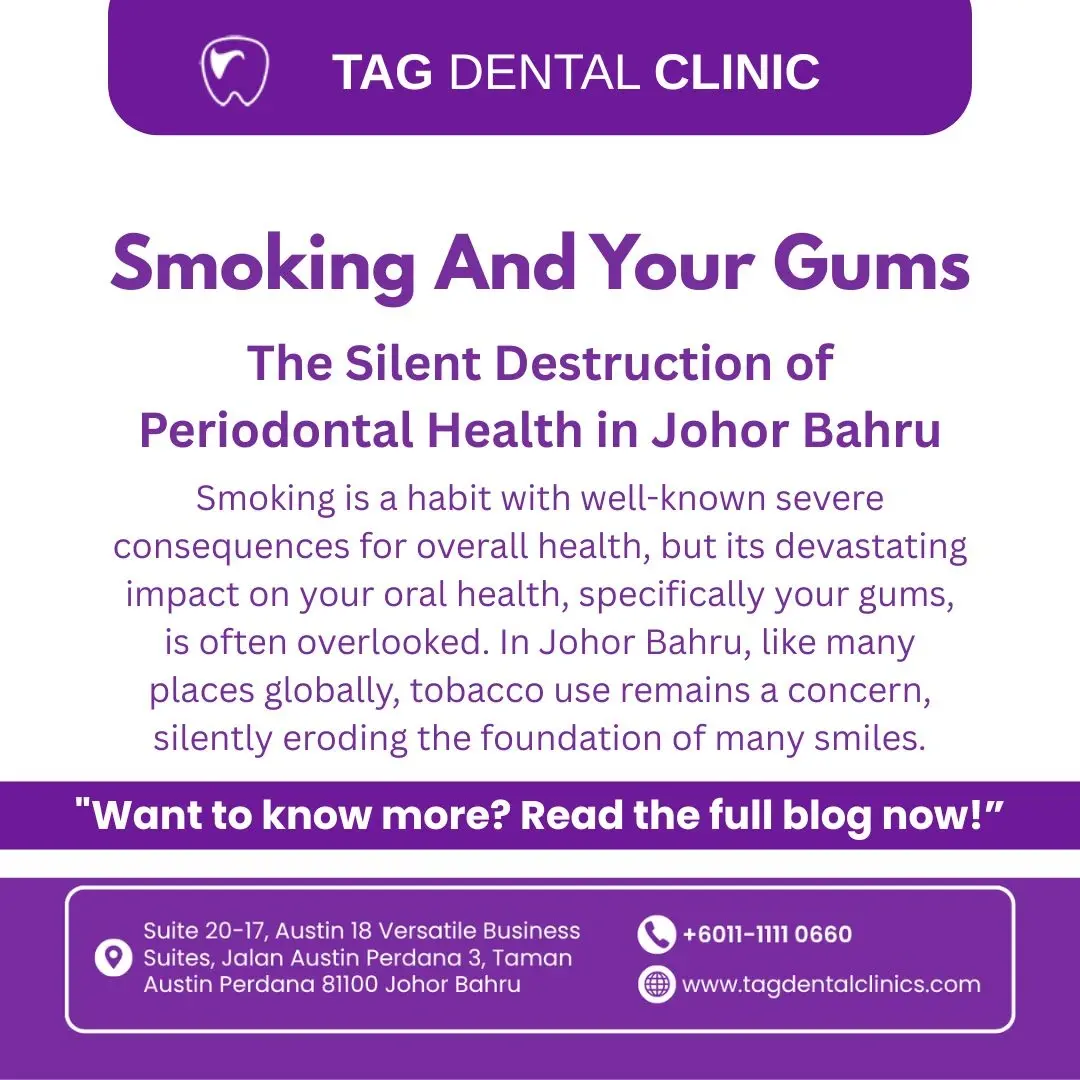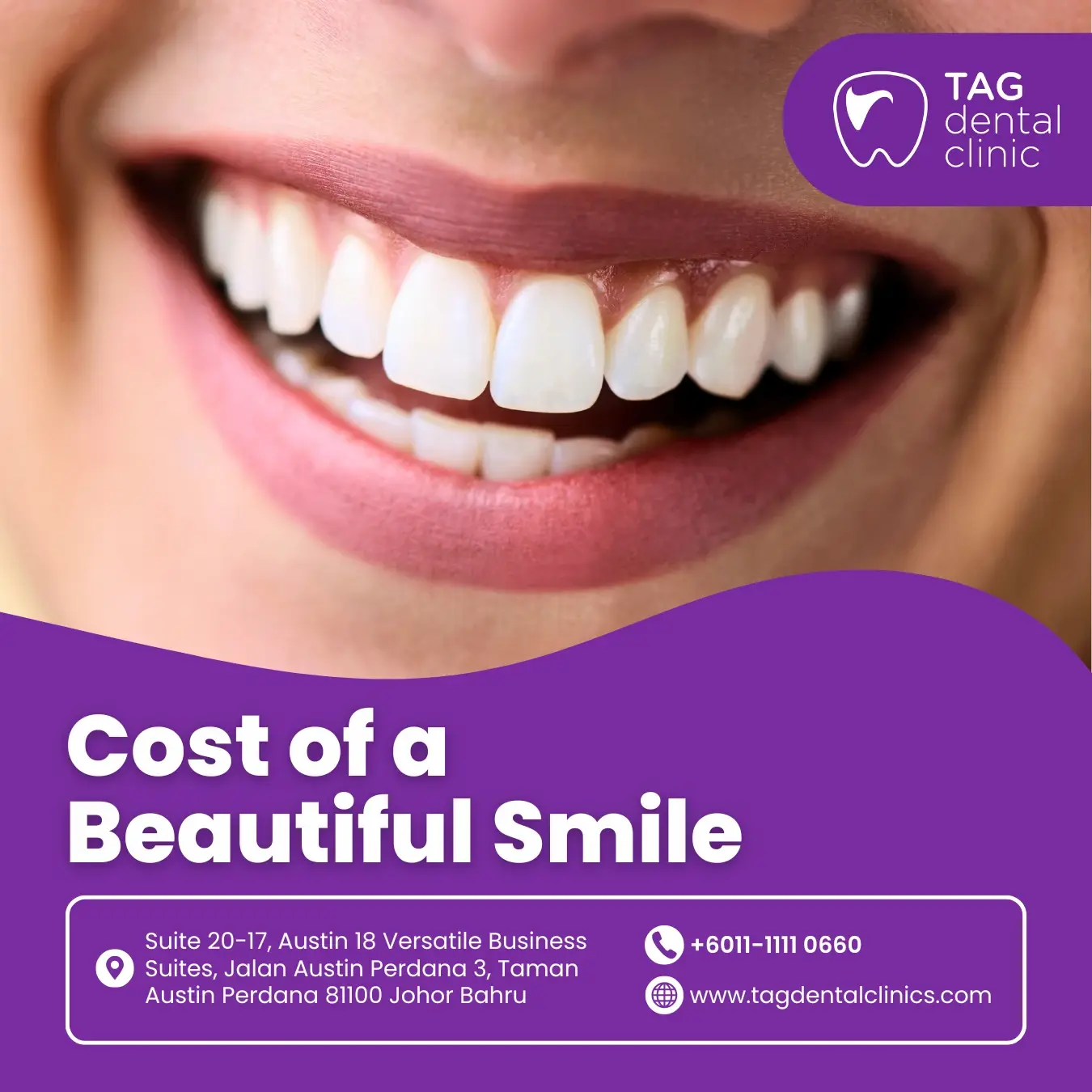Smoking And Your Gums
Table Of Content

The Silent Destruction of Periodontal Health in Johor Bahru
Smoking is a habit with well-known severe consequences for overall health, but its devastating impact on your oral health, specifically your gums, is often overlooked. In Johor Bahru, like many places globally, tobacco use remains a concern, silently eroding the foundation of many smiles.
At TAG Dental Clinic, we regularly witness the profound and destructive effects of smoking on periodontal health. This blog post aims to shed light on how smoking silently destroys your gums, including gum recession, increased implant failure risks, the dangers of smoking alternatives, and the crucial need for patient education tailored to local tobacco habits.
How Smoking Harms Your Gums

Smoking is one of the most significant risk factors for developing severe gum disease (periodontitis). Unlike the visible staining it causes on teeth, its damage to gums is often insidious and less obvious until advanced stages.
Here's how tobacco wreaks havoc on your periodontal health:
- Reduced Blood Flow & Oxygen Starvation: Nicotine in tobacco products causes blood vessels in the gums to constrict. This reduces vital blood flow and oxygen supply to the gum tissues and bone, hindering their ability to stay healthy, fight infection, and heal. This is why smokers often have less bleeding gums, even with severe gum disease – the compromised blood supply masks a critical warning sign.
- Weakened Immune System: Smoking impairs your body's immune response, making it harder to fight off bacterial infections in the gums. This allows harmful bacteria to multiply unchecked, leading to more aggressive and rapidly progressing gum disease.
- Increased Toxin Exposure: The thousands of chemicals in tobacco smoke directly irritate and damage gum tissues, promoting inflammation and breakdown of the supporting structures around your teeth.
- Altered Oral Environment: Smoking can change the balance of bacteria in your mouth, favoring the growth of more harmful, aggressive periodontal pathogens.
Key Destructive Impacts: Gum Recession & Beyond

The consequences of smoking on your gums are severe and often irreversible:
- Gum Recession: Smoking significantly increases the risk of gum recession, where the gum tissue pulls away from the teeth, exposing the sensitive tooth roots. This not only makes teeth appear longer but also increases sensitivity, makes teeth more prone to root decay, and can contribute to tooth loss. Once gum tissue is lost, it cannot grow back naturally, often requiring complex and costly gum graft surgery.
- Increased Risk of Periodontitis: Smokers are two to seven times more likely to develop periodontitis, a severe form of gum disease that destroys the bone supporting your teeth. This leads to loosening teeth and, eventually, tooth loss.
- Poor Response to Treatment: Gum disease in smokers is often more challenging to treat. The compromised healing ability means that non-surgical and surgical periodontal therapies may be less effective, and recovery times are significantly prolonged.
- Bad Breath (Halitosis): Beyond the smell of smoke itself, the ongoing bacterial activity and tissue destruction contribute to persistent and unpleasant bad breath.
Dental Implants and Smoking: A Risky Combination

For individuals in Johor Bahru considering replacing missing teeth with dental implants, smoking presents a significant hurdle:
- Higher Implant Failure Risks: Studies consistently show that dental implant failure rates are considerably higher in smokers compared to non-smokers. This is due to impaired bone healing (osseointegration) around the implant, reduced blood supply, and an increased risk of infection (peri-implantitis).
- Delayed Healing: The healing process after implant surgery is severely compromised, increasing the risk of complications like dry socket and infection.
- Peri-implantitis: Smokers are much more susceptible to peri-implantitis, an inflammatory condition that affects the gum and bone tissues around a dental implant, leading to bone loss and potential implant failure.
At TAG Dental Clinic, we thoroughly discuss these risks with our smoking patients before any implant procedure. Often, smoking cessation is a prerequisite for successful implant treatment.
Smoking Alternatives: Are They Safer for Your Gums?

With the rise of e-cigarettes and vaping, many smokers in Malaysia might view these as safer alternatives. However, emerging research indicates that smoking alternatives are far from harmless to oral health:
- Vaping and E-Cigarettes: While they don't contain tobacco, most e-liquids contain nicotine, flavorings, and other chemicals (like propylene glycol and vegetable glycerin). Nicotine still causes vasoconstriction, reducing blood flow to the gums. The heating and aerosolizing of chemicals can lead to dry mouth, inflammation, and changes in the oral microbiome, potentially increasing the risk of gum disease and tooth decay. The long-term effects are still being studied, but preliminary evidence suggests they are detrimental to gum health, albeit possibly less severe than traditional cigarettes.
Patient Education and Local Tobacco Habits in Johor Bahru

Addressing smoking and its impact requires direct, empathetic patient education. In Malaysia, local tobacco habits vary, but the prevalence remains a public health challenge.
At TAG Dental Clinic, we:
- Educate Without Judgment: We explain the specific risks of smoking to your oral health in an understandable way.
- Identify Signs: We are vigilant in detecting the masked signs of gum disease in smokers during routine check-ups.
- Offer Support: We discuss strategies for smoking cessation, highlighting the immediate and long-term benefits for oral health, including improved healing, better treatment outcomes, and reduced risk of further gum destruction. Quitting smoking is often the single most impactful step a patient can take to improve their periodontal health.
Your Gums Deserve Better: Take Action Today

Your gums are the foundation of your smile and overall oral health. Smoking silently undermines this foundation, leading to serious and often irreversible damage. Even if you've smoked for years, quitting can significantly improve your gum health and the success of any future dental treatments.
At TAG Dental Clinic in Johor Bahru, we are committed to helping you achieve and maintain optimal oral health. If you are a smoker, or know someone who is, and are concerned about your gum health, we urge you to seek professional advice.
Frequently Asked Questions (FAQs) about Smoking & Gum Health

Nicotine restricts blood flow to the gums, masking the common symptom of bleeding, which is a key warning sign of gum inflammation.
2. Can gum recession caused by smoking be reversed?No, once gum tissue is lost, it cannot naturally grow back. Surgical procedures like gum grafts may be necessary to cover exposed roots.
3. How much higher is the risk of gum disease for smokers?Smokers are significantly more prone to gum disease, with risks being 2 to 7 times higher than non-smokers, and the disease tends to be more severe.
4. Does quitting smoking improve gum health?Absolutely. Quitting smoking is the single most effective step to improve periodontal health, allowing gums to heal and respond better to treatment.
5. Are dental implants safe for smokers?While possible, smokers face a much higher risk of implant failure and complications like peri-implantitis. Smoking cessation is highly recommended before and after implant surgery.
6. Do e-cigarettes/vaping affect gum health?Yes, research suggests that e-cigarettes and vaping can cause dry mouth, inflammation, and other gum problems due to nicotine and other chemicals, although long-term effects are still being studied.
7. What is peri-implantitis?It's an inflammatory condition affecting the tissues around a dental implant, similar to gum disease around natural teeth, leading to bone loss and potential implant failure. Smokers have a higher risk.
8. What steps can I take to protect my gums if I smoke?The most important step is to quit smoking. Also, maintain impeccable oral hygiene, and schedule frequent dental check-ups and professional cleanings.
9. Will my dentist know if I smoke, even if I don't tell them?Yes, dentists can often detect signs of smoking on your gums, teeth, and overall oral cavity, even if you don't disclose it.
10. Does smoking affect dental treatments other than implants?Yes, smoking can delay healing after tooth extractions, make root canal treatments less successful, and affect the overall outcome of any oral surgery or restorative procedures.
Don't let smoking silently destroy your smile. Take charge of your oral health today.

At TAG Dental Clinic in Johor Bahru, we are here to support you in protecting your gums and achieving a healthier, brighter future.
Concerned about smoking's impact on your gums? Contact TAG Dental Clinic in Johor Bahru for a comprehensive oral health assessment and personalized advice.





